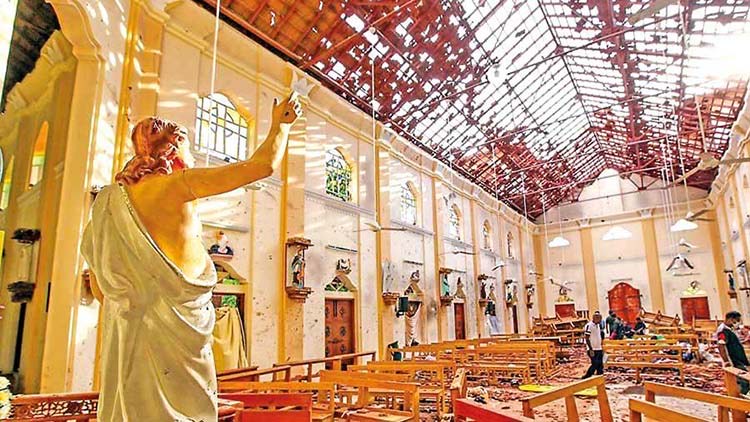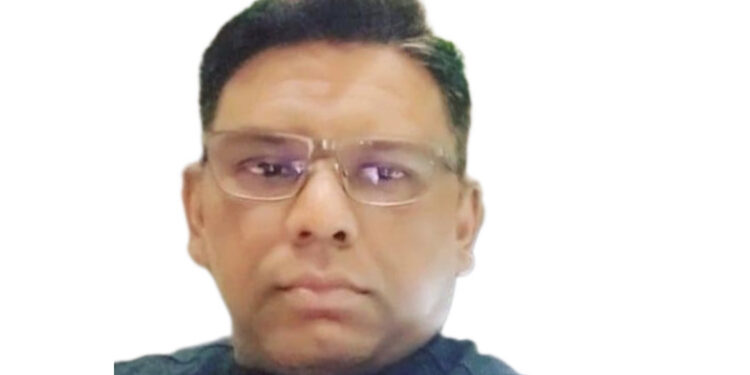Hyder Ali – Paris France
Six years have passed since the horrific Easter Sunday bombings that shook Sri Lanka on April 21, 2019, leaving over 270 dead and hundreds injured. Yet, the truth behind the attacks remains shrouded in mystery, with successive governments failing to deliver justice. Instead, the tragedy has been exploited for political gain, leaving victims’ families and the Catholic community disillusioned.
A Mystery That Endures
Despite multiple investigations, no definitive answer has emerged about the real masterminds behind the attacks. In 2023, Channel 4’s documentary, featuring claims by Anzeer Azath Moulana, introduced a new narrative—alleging high-level political involvement. Yet, Sri Lanka’s investigative bodies have failed to act decisively, raising suspicions of a deliberate cover-up.

The then-government, led by President Gotabaya Rajapaksa, vowed to uncover the truth, but his administration’s probe went nowhere. After Rajapaksa was ousted in the 2022 people’s uprising, Ranil Wickremesinghe served as interim president for two years—yet no breakthrough came. Now, under President Anura Kumara Dissanayake (AKD), promises of justice have resurfaced, but skepticism remains high.
A Political Football
The Easter attacks have become a potent campaign tool for Sri Lanka’s politicians. Gotabaya Rajapaksa rode to power in 2019 on a wave of nationalist sentiment fueled by the attacks. Ranil Wickremesinghe, during his interim presidency, used the issue to consolidate his position but delivered little.
Now, President AKD—who during the 2024 local government elections boldly claimed he would **”reveal the real culprits before April 21, 2025″**—has also failed to fulfill his pledge. As the deadline passed without answers, it became clear this was yet another empty campaign promise, further eroding public trust.
Cardinal Malcolm Ranjith and Sri Lanka’s Catholic community, once hopeful for justice, now feel betrayed. Initially trusting Gotabaya, then briefly AKD, they see the same pattern: politicians weaponize the tragedy for votes, then abandon their pledges. The Cardinal has repeatedly accused the state of shielding the real culprits, suggesting collusion between extremists and political elites.
Islamic Extremism: A Lingering Threat
Despite crackdowns, reports indicate radical Islamist networks still operate in Sri Lanka, having regrouped under new names. The failure to dismantle these networks completely raises concerns about future security risks.
Islamic Extremism: An Enduring Threat
The hard truth is that radical Islamist networks, including ISIS sympathizers, remain active in Sri Lanka—not because they are undetectable, but because they are allowed to persist. After the Easter attacks, we saw social media flooded with posts glorifying ISIS, some even celebrating the massacre of our own people. Many of these individuals were arrested—yet today, shockingly, they walk free.
This isn’t just a failure of security forces; it’s a failure of political will. If Sri Lanka truly wanted to eliminate extremism, we would not see:
-Known ISIS supporters released back into society.
Radical groups allowed to rebrand and regroup.
No serious legal consequences for those who incite violence.
I believe there are only two explanations for this negligence: either our authorities are dangerously incompetent, or someone powerful finds it useful to keep extremism as a controlled threat—a bogeyman to manipulate public fear when politically convenient.
The Easter attacks proved that ignoring extremism has deadly consequences. Yet six years later, we’re making the same mistakes. Unless we demand real accountability—not just from terrorists, but from those enabling them—history will repeat itself. And next time, the blood will be on more hands than just the bombers’.
This isn’t speculation—it’s what happens when justice is traded for political games. And as a nation, we are running out of time to change course.
Who is The Mastermind?
The Sri Lankan government’s intelligence apparatus, amid a shifting political landscape, continues to spotlight individuals as alleged masterminds behind the Easter attacks, raising skepticism and revealing a troubling tendency to scapegoat rather than pursue a thorough investigation. This recurring narrative undermines the credibility of the investigation and highlights a disconcerting trend of prioritizing blame over accountability and truth, as authorities periodically introduce new suspects, diverting attention from deeper systemic issues and maintaining a narrative that serves the interests of those in power.
Justice Delayed, Justice Denied?
Six years on, the victims’ families continue their agonizing wait. With each broken promise, faith in the system crumbles further. Will Sri Lanka’s leaders ever prioritize truth over politics? Or will the Easter Sunday attacks remain another unresolved tragedy in the nation’s troubled history?



